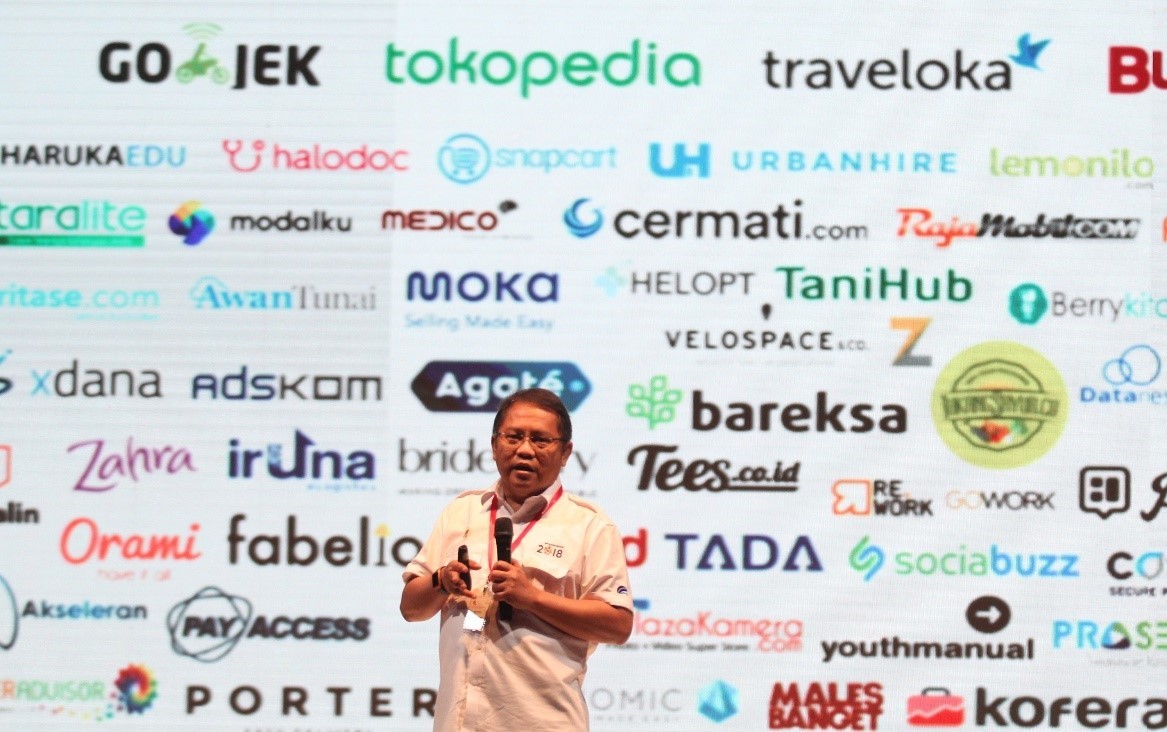Popular Reads
Top Results
Can't find what you're looking for?
View all search resultsPopular Reads
Top Results
Can't find what you're looking for?
View all search resultsSame old issues slow Indonesia’s digital economy
Change text size
Gift Premium Articles
to Anyone
 Cultivating unicorns: Communications and Information Minister Rudiantara delivers a speech on May 9 to open the inaugural Nexticorn International Summit Indonesia in Nusa Dua, Bali. The two-day summit will match Indonesian digital startups with local and foreign venture capitalists to boost the digital economy. (JP/Zul Trio Anggono)
Cultivating unicorns: Communications and Information Minister Rudiantara delivers a speech on May 9 to open the inaugural Nexticorn International Summit Indonesia in Nusa Dua, Bali. The two-day summit will match Indonesian digital startups with local and foreign venture capitalists to boost the digital economy. (JP/Zul Trio Anggono)
T
he British like to drink tea and the Brazilians love to play soccer. Every country has stereotypes attached to it, and while we must take each stereotype with a pinch of salt, there is usually a grain of truth behind why a country is perceived in a certain way.
Unfulfilled potential has always been the quintessential story of Indonesia. Whenever you talk with someone who is familiar with Indonesia’s economy, you will most likely hear the same thoughts.
Indonesia is a blessed country with huge potential, and we are advancing toward the era of the digital economy. However, the same issues that have hampered Indonesia for the last few decades persist, and these same issues prevent our digital economy from skyrocketing.
First and foremost, technological development relies heavily on a skilled labor force. Unfortunately, human capital has always been an obstacle.
Indonesia’s abundant workforce of 134 million people does not necessarily translate into high productivity. According to the Global Competitiveness Index, labor productivity is one of the key problems for Indonesia’s national competitiveness.
You can ask tech start-ups and they will all tell you the same story: It is very difficult to find and hire good talent. The undersupply of talent causes cash-rich companies to overcompensate and pay a premium on their workers, squeezing smaller companies from hiring the right people. This is exacerbated by a brain drain of 9 million Indonesians seeking better work abroad.
On top of human capital, a supportive ecosystem is also needed for our digital economy to flourish. Easy access to funding for start-ups, the availability of mentors and accelerator programs, and infrastructure such as fast internet are imperative.
Sadly, creating these ecosystems has never been our forte. As other countries are gearing up for 5G internet, we are still playing catch-up. A few years ago, an Indonesian ex-minister for technology even insinuated that we didn’t need fast internet, since it would only be used for downloading illegal content.
If this issue resonates with you, it is probably because most Indonesians agree with the fact that we are notoriously slow in building our infrastructure.
Data security is also an issue of utmost importance. We don’t need to look far to find examples of what can go wrong in a digital economy. Mt Gox was a Japanese bitcoin exchange, which at one point handled more than 70 percent of all bitcoin transactions in the world.
The company had faced security issues since 2011 but despite these telltale signs continued to take a nonchalant approach to data security.
In 2014, it declared bankruptcy after losing more than US$450 million worth of bitcoins belonging to its customers. Hackers might not only be interested in monetary rewards, but user data too.
We have more than 100 million smartphone users in Indonesia, and user data is a goldmine of treasure. This explains why, when Cambridge Analytica clandestinely used confidential data for political purposes, it became such contentious news.
The moral of the story is that data security and confidentiality are both vital. A breach of trust in either may be irreversible, and consumers may find it difficult to embrace digital technology afterward. At the same time, a strong set of rules to govern the tech industry is important. It is extremely difficult for current laws — which were designed without the foresight of technological progress — to be effective. Look at the legal battles between conventional taxi operators and app-based ride-hailing platforms.
Although the latter have been operating in Indonesia for a few years and there are now more than 91,000 ride-sharing vehicles in operation, we are still debating what fares they should charge and whether the drivers should be classified as employees or independent contractors.
Similarly, although financial technology has been around for at least five years, only in 2018 did the Financial Services Authority issue concrete guidelines to regulate the industry. Indonesia has consistently taken a reactionary approach toward designing its laws.
To help our digital economy grow, we need to change course: New laws should be designed based on forward-thinking coupled with the anticipation of how our economy is changing.
In 2018, I cofounded Populix, a research startup, and thus I have first-hand experience of how these key issues are preventing Indonesia from unlocking the potential of its digital economy. Because Indonesia has always been mired by the same old problems, neither an overnight solution nor a panacea exists.
The situation isn’t all doom and gloom, however. By being aware of the problems we face, at least we know what needs to be done. In fact, 52 percent of young Indonesians feel optimistic about the country’s economic future. We must therefore take a structured and coherent approach toward solving the problems identified above.
Having said this, it would be misguided to assume that the government could solve these issues on its own. From app users to tech companies to venture capital investors, what we need is a collaborative effort involving all stakeholders.
At the end of the day, a successful digital economy will benefit all Indonesians.
***
The writer is the CEO and cofounder of Populix, a consumer insight platform.









